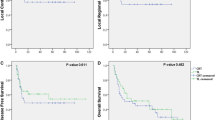Abstract
To evaluate oncologic and functional outcomes and prognostic factors in patients with locally advanced hypopharyngeal cancer included in an induction chemotherapy (ICT)-based larynx preservation program in daily clinical practice. All patients with locally advanced (T3/4, N0–3, M0) hypopharyngeal squamous cell carcinoma, technically suitable for total pharyngo-laryngectomy, treated by docetaxel (75 mg/m2, day 1), cisplatin (75 mg/m2, day 1) and 5-fluorouracil (750 mg/m2/day, day 1–5) (TPF)-ICT (2–3 cycles) for larynx preservation at our institution between 2004 and 2013, were included in this retrospective study. Prognostic factors of oncologic (overall, cause-specific and recurrence-free survival: OS, SS and RFS) and functional (dysphagia outcome and severity scale, permanent enteral nutrition, larynx preservation) outcomes were assessed in univariate and multivariate analyses. A total of 53 patients (42 men and 11 women, mean age 58.6 ± 8.2 years) were included in this study. Grade 3–4 toxicities were experienced by 17 (32 %) patients during ICT. The rate of poor response (response <50 % without larynx remobilization) to ICT was 10 %. At 5 years, OS, SS and RFS rates were 56, 60 and 54 %, respectively. Four patients required definitive enteral nutrition (permanent enteral tube feeding). The rate of patients alive, disease-free and with a functional larynx at 2 years was 58 %. T4 tumor stage (p = 0.005) and response to ICT <50 % (p = 0.02) were independent prognostic factors of OS. Response to ICT was significantly associated with the risk of permanent enteral nutrition (p = 0.04) and larynx preservation (p = 0.01). In daily clinical practice, a TPF-ICT-based larynx preservation protocol can be used in patients with locally advanced hypopharyngeal cancer with satisfactory results in terms of tolerance, efficacy and oncologic and functional outcomes.

Similar content being viewed by others
References
Hirano S, Tateya I, Kitamura M et al (2010) Ten years single institutional experience of treatment for advanced hypopharyngeal cancer in Kyoto University. Acta Otolaryngol Suppl 563:56–61
Takes RP, Strojan P, Silver CE et al (2012) Current trends in initial management of hypopharyngeal cancer: the declining use of open surgery. Head Neck 34:270–281
Agopian B, Dassonville O, Chamorey E et al (2011) Total pharyngolaryngectomy in the 21st century: indications, oncologic and functional outcomes. Rev Laryngol Otol Rhinol (Bord) 132:209–214
Lefebvre JL, Ang KK (2009) Larynx Preservation Consensus Panel. Larynx preservation clinical trial design: key issues and recommendations-a consensus panel summary. Int J Radiat Oncol Biol Phys 73:1293–1303
Pointreau Y, Garaud P, Chapet S et al (2009) Randomized trial of induction chemotherapy with cisplatin and 5-fluorouracil with or without docetaxel for larynx preservation. J Natl Cancer Inst 101:498–506
Lefebvre JL, Pointreau Y, Rolland F et al (2013) Induction chemotherapy followed by either chemoradiotherapy or bioradiotherapy for larynx preservation: the TREMPLIN randomized phase II study. J Clin Oncol 31:853–859
Posner MR, Norris CM, Wirth LJ et al (2009) Sequential therapy for the locally advanced larynx and hypopharynx cancer subgroup in TAX 324: survival, surgery, and organ preservation. Ann Oncol 20:921–927
O’Neil KH, Purdy M, Falk J et al (1999) The dysphagia outcome and severity scale. Dysphagia 14:139–145
Lefebvre JL, Andry G, Chevalier D, EORTC Head and Neck Cancer Group et al (2012) Laryngeal preservation with induction chemotherapy for hypopharyngeal squamous cell carcinoma: 10-year results of EORTC trial 24891. Ann Oncol 23:2708–2714
Vermorken JB, Remenar E, van Herpen C, EORTC 24971/TAX 323 Study Group et al (2007) Cisplatin, fluorouracil, and docetaxel in unresectable head and neck cancer. N Engl J Med 357:1695–1704
Huang WY, Jen YM, Chen CM et al (2010) Intensity modulated radiotherapy with concurrent chemotherapy for larynx preservation of advanced resectable hypopharyngeal cancer. Radiat Oncol 5:37–44
Bhayani MK, Hutcheson KA, Barringer DA et al (2013) Gastrostomy tube placement in patients with hypopharyngeal cancer treated with radiotherapy or chemoradiotherapy: factors affecting placement and dependence. Head Neck 35:1641–1646
Ravasco P (2011) Nutritional support in head and neck cancer: how and why? Anticancer Drugs 22:639–646
Atasoy BM, Yonal O, Demirel B et al (2012) The impact of early percutaneous endoscopic gastrostomy placement on treatment completeness and nutritional status in locally advanced head and neck cancer patients receiving chemoradiotherapy. Eur Arch Otorhinolaryngol 269:275–282
Author information
Authors and Affiliations
Corresponding author
Ethics declarations
Conflict of interest
The authors report no conflicts of interest.
Rights and permissions
About this article
Cite this article
Bozec, A., Benezery, K., Ettaiche, M. et al. Induction chemotherapy-based larynx preservation program for locally advanced hypopharyngeal cancer: oncologic and functional outcomes and prognostic factors. Eur Arch Otorhinolaryngol 273, 3299–3306 (2016). https://doi.org/10.1007/s00405-016-3919-3
Received:
Accepted:
Published:
Issue Date:
DOI: https://doi.org/10.1007/s00405-016-3919-3




